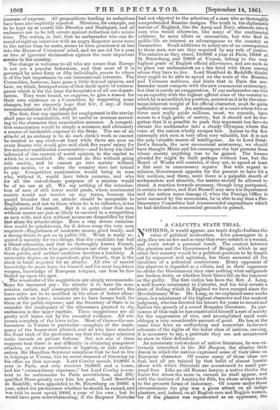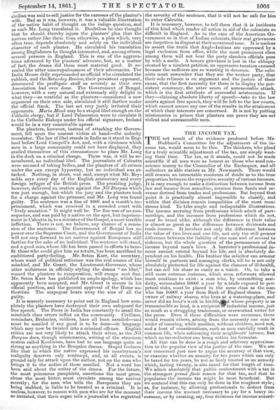• ACALCUTTA STATE TRIAL. N OTHING, it would appear, can teach
Anglo-Indians the value of political moderation. Like passengers in a ship, they are so few and so near that every scratch is a wound, and every retort a personal insult. The contest between the planters and the Government of Bengal, which in any other free country would be a political question to be fought out by argument and agitation, has there assumed all the virulence of a polemical controversy. Every opponent of the planters is regarded as a villain, and in their eagerness to strike the Government they care nothing what safeguards are broken down, or whether their blows fall on the innocent or the guilty. The first victim has been the Rev. J. Long, a well known missionary in Calcutta, and his trial reveals a state of feeling which in England we have escaped since the Revolutionary War. Mr. Long, as we explained some weeks since, is a missionary of the highest character and the weakest judgment, who has devoted his leisure for years to record and further the growth of a sound Bengalee literature. In pur- suance of that task he has constituted himself a sort of society for the suppression of vice, and accomplished amid some obloquy a very considerable amount of good. He has at the same time been an unflinching and somewhat indiscreet advocate of the rights of the lower class of natives, earning, it is necessary to say, a gratitude they are not accustomed to show to their defenders.
As missionary and student of native literature, he was ex- tremely interested in the Nil Durpan, the abusive little drama in which the natives expreised some of their ideas on European character. Of course many of those ideas are foul, and all are tainted by that habit of almost lunatic abuse with which Orientals are accustomed to assail per- sonal foes. Like an old Roman lawyer, a native thinks the fouler the abuse the more in earnest he shall appear, and with the instinct of Asiatics for filth, his abuse always tends to the grossest forms of indecency. Of course under those circumstances the play was a gross attack on all indigo planters, and, indeed, on all English men and English women, for if the planter was represented as an oppressor, the civilian was said to sell justice for the caresses of the planter's wife. Bad as it was, however, it was a valuable illustration of the native habit of thought on the indigo question, and as such Mr. Long translated it. Doubtless he also thought that he should thereby injure the planters' plea that the natives rather like them than otherwise, a plea which, very often true, depends absolutely and solely on the individual character of each planter. He circulated his translation among Englishmen he thought interested, and, among others, several persons in England. This is one of the aggrava- tions advanced by the planters' advocate, but, as a matter of fact, the drama did them most material good. It re- vealed the utter unscrupulousness of their adversaries. The India House drily reprimanded an official who circulated the rubbish, and the Saturday Review, their persistent opponent, denounced the profligate stuff as severely as their own Association had ever done. The Government of Bengal, however, with a very natural and extremely silly delight in what they—as wrathful as the planters—considered a new argument on their own side, circulated it still further under the official frank. The last act very justly irritated their opponents. Maria Monk may be a stupid libel enough on the Catholic clergy, but if Lord Palmerston were to circulate it to the Catholic Bishops under his official signature, Ireland would be in a very conceivable uproar. The planters, however, instead of attacking the Govern- ment, fell upon the nearest victim at hand—the unlucky translator. The law of libel stands in India as it stood in Eng- land before`Lord Campell's Act, and, with a virulence which men in a large community could not have displayed, they availed themselves of this circumstance to place Mr. Long in the dock on a criminal charge. There was, it will be re- membered, no individual libel. The journalists of Calcutta were accused of taking bribes, anal the planters of all crimes under the sun except hypocrisy, but no individual was at- tacked. Nothing, in short, was said, except what Mr. Rey- nolds says every day of the English aristocracy and every foreign refugee of the British press. The presiding judge, however, delivered au oration against the Nil Durpun which was just enough, but which the jury and the planters took for a charge against the prisoner, and Mr. Long was found guilty. The sentence was a fine of 1001. and a month's im- prisonment, which was received in a crowded court with "lively sensation." It might well be. The fine was of no con- sequence, and was paid by a native on the spot, but imprison- ment in Calcutta is, to a minister of the Gospel, a most terrible infliction. There is not, we believe, any chance of a remis- sion of the sentence. The Government of Bengal has no power over the Supreme Court, and the Government of India will not step forward to set natives against Europeans still further for the sake of an individual. The sentence will stand, and a good man,whose life has been passed in efforts to bene- fit those who could give him no return, has been sacrificed to embittered party-feeling. Mr. Seton Karr, the secretary, whose want of political reticence was the real source of the mischief, and Mr. Grant, the Lieutenant-Governor, whose utter unfairness in officially styling the drama "no libel," roused the planters to exasperation, will escape scot free. Mr. Seton Karr has published an ample apology, which has apparently been accepted, and Mr. Grant is secure in his official position, and the general approval of the Home au- thorities. The scapegoat bears away the sins of all the guilty. It is scarcely necessary to point out in England how com- pletely the planters have destroyed their own safeguard for free speech. The Press in India has constantly to assail the mischiefs class errors inflict on the community. Civilians, zemindars, Brahmins, soldiers, have all been assailed—and must be assailed if any good is to be done—in language which may now be twisted into a criminal offence. English critics are not very likely to attack their wives, as the Nil Durpun does, though missionaries, writing of the atrocious system called Koolinism, have had to use language quite as strong as anything in the Bengalee drama. Stupid foulness like that in which the native expressed his countrymen's malignity deserves only contempt, and, at all events, is ground only for attack upon the author, not on the man who brings it to the notice of those assailed. Not a word has been said about the writer of the drama. For the future, the most poisonous pamphlets, assertions the most gross, abuse the most bitter, must circulate among the natives secretly ; for the man who tells the Europeans they are being stabbed, is liable to be treated as a criminal. It is useless, however, to reason with men who are for the moment so irritated, that their organ tells a journalist who regretted the severity of the sentence, that it will not be safe for him to enter Calcutta.
It is necessary, however, to tell them that it is incidents of this kind which render all action in aid of the colonists so difficult in England. As in the case of the American Go- vernment so in that of Indian colonists, their real grievances are forgotten in disgust at their occasional tone. It is useless to assert the truth that Anglo-Indians are oppressed by a legal exclusion from office, while the most prominent class among them will not bear the party slanders officials pass by with a smile. A tenure grievance is lost in the obloquy created by a virulent petition, an oppressive taxation excused because the sufferers are so wanting in decorum. The colo- nists must remember that they are the weaker party, that their sole reliance is on argument and the justice of their cause, that the first necessity for them is to display the per- sistent constancy, the utter scorn of unreasonable attack, which is the first attribute of successful aristocracies. If they—claiming absolute liberty of speech—take to the law courts against free speech, they will be left to the law courts, which cannot secure any one of the results in the attainment of which their interests are concerned. It is not by putting missionaries in prison that planters can prove they are not violent and unreasonable men.































 Previous page
Previous page